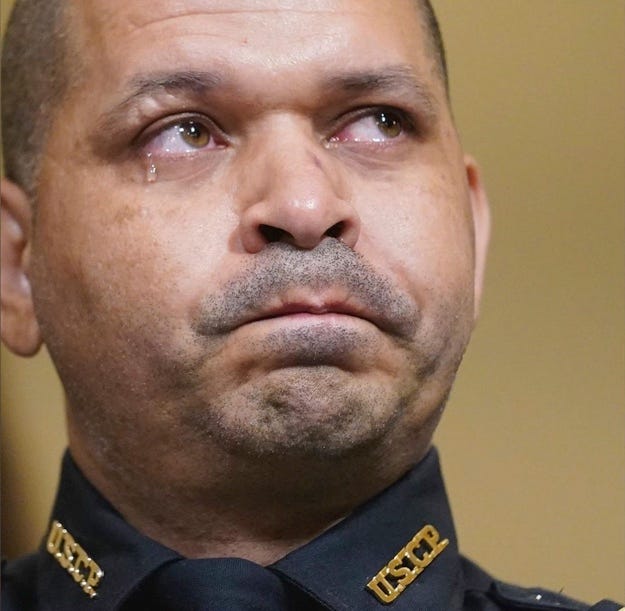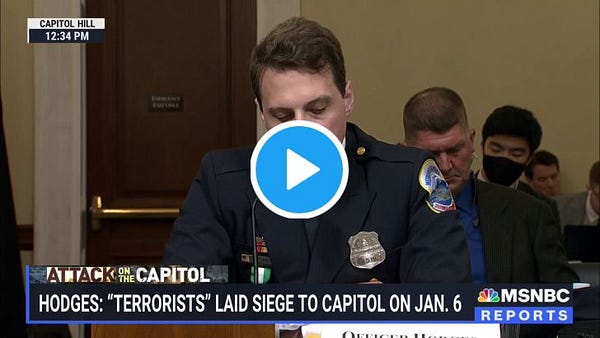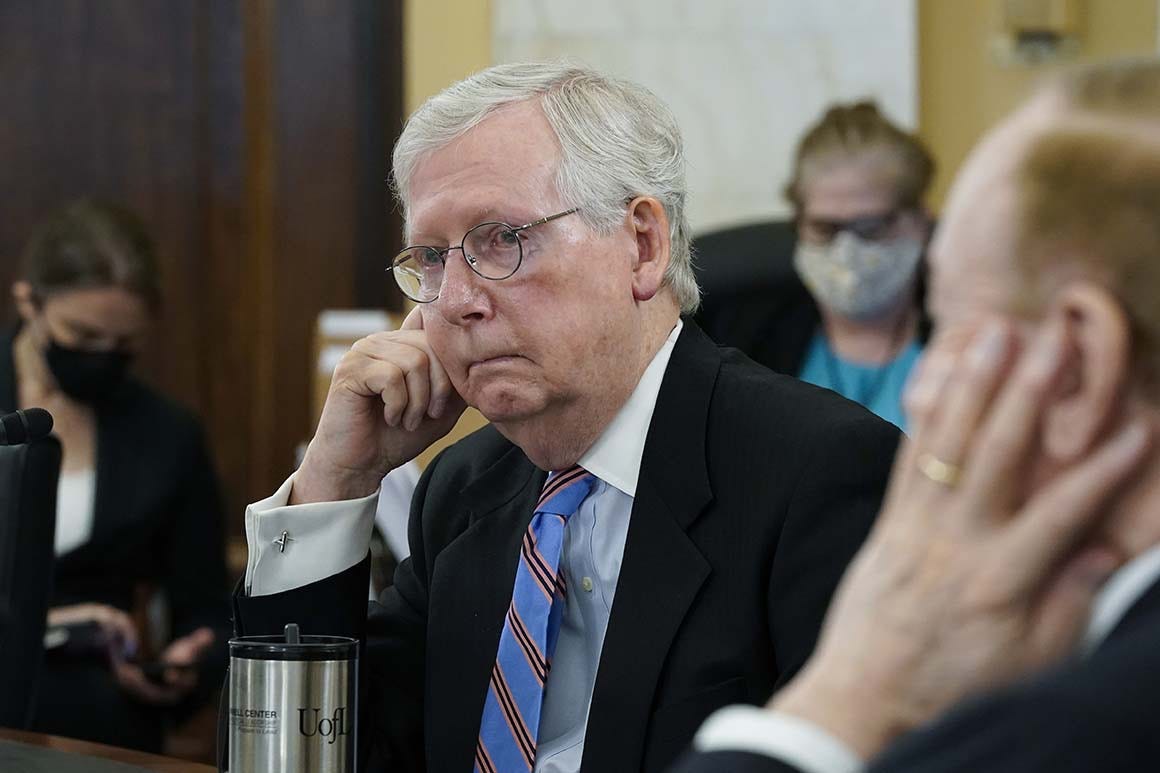Mitch's Blunder
By rejecting a bipartisan commission, McConnell hurt the GOP brand and doomed his party to months of damaging headlines.

The opening hours of the 1/6 Committee hearings were a triumph. I’ve watched congressional hearings as far back as the 1970s and can’t remember any others as moving, historic and tight. No wonder that three police officers and three members of Congress choked up when discussing the stakes for American democracy.
When they work, hearings do more than reveal information and showcase new public figures; they can reframe the debate.
Officer Daniel Hodges’ cries for help when he was being crushed between a stolen police shield and a door frame are now part of the permanent soundtrack of the 21st century. But Hodges also changed the conversation by repeatedly calling the insurrectionists by their proper name—terrorists. He even read the statute proving it.


This went beyond straightening out Republicans who saw the terrorists as mere “tourists.” It reminded me of what President George W. Bush told the world after 9/11: “You are either with us…or with the terrorists.” The so-called “War on Terror” didn’t go well, but the binary framing shaped American politics for nearly two decades.
Now every American must face a similar question: Are you with the Capitol Police and other defenders of democracy…or with those who would downplay and excuse the violent acts of domestic terrorists?
Do you want to face up to this terrifying event….or kiss up to a former president whom even Mitch McConnell said in January was “practically and morally responsible” for the first attack on the U.S. Capitol since 1815?
Now every American must face a similar question: Are you with the Capitol Police and other defenders of democracy…or with those who would downplay and excuse the violent acts of domestic terrorists?
Police heroes or domestic terrorists? Whose side are you on? The Republican Party—afflicted by what Rep. Liz Cheney rightly calls a “cancer”—is in danger of being seen by the public as “with the terrorists.”
A reporter questioning Cheney after the hearing offered a pithy summary of the new GOP line articulated Tuesday morning by House Minority Leader Kevin McCarthy:
“What did Nancy Pelosi know and when did she know it?”
McCarthy’s lame attempt to blame the House speaker for the whole thing is sign that the GOP’s response to the insurrection has gone off the rails.
It’s wrong on the facts: Pelosi was no more in the chain of command on 1/6 than McConnell, and the incompetent House sergeant-at-arms, Paul D. Irving, was appointed by her Republican predecessor, John Boehner, in 2012.
And it’s wrong on the politics: McCarthy’s odds of “changing the narrative” to one that favors Trump were small before the four police officers showed up at the select committee and even smaller after.
Their harrowing and eloquent testimony—and the impressive role played by conservatives Cheney and Adam Kinzinger—lifted the 1/6 Committee above what Kinzinger called “petty politics” and into American history.
Obviously, historians will care much more about the drama of the insurrection than why Jim Jordan, a nasty Trump stooge (and material witness in the case), wasn’t allowed to serve on the committee. But now even lazy-minded journalists—always eager for a partisan brawl—will likely shift from who-appointed-who to how the committee gets to the bottom of the story.
For instance, on the question of why the insurrectionists didn’t have more guns, we will soon learn that Enrique Tarrio, leader of the Proud Boys, was jailed for illegal gun possession on January 4. So for the next 36 hours, word went out to the Trumpsters to leave their guns at home or the hotel or to hide them in backpacks.
To grasp why the 1/6 Committee investigation is shaping up as a political fiasco for Republicans, recall what happened on Capitol Hill during the last week of May. After the House overwhelmingly approved the establishment of an independent bipartisan commission, the plan was filibustered to death in the Senate by McConnell, who had decided that he had to kill the commission to win the midterms.
To get his Republican colleagues to change their minds and oppose the commission, McConnell circulated an interview that quoted Democratic strategist James Carville urging fellow Democrats to “make Republicans own that insurrection every day.”
Of course that’s exactly what will happen now—an outcome that could more easily have been avoided had Republicans stuck with the independent commission they had earlier supported.
The press—still smitten with McConnell’s vaunted political skills—missed the story. After the May filibuster, the New York Times reported that the death of the commission “all but guaranteed that there would be no comprehensive nonpartisan inquiry into the attack’s root causes, the former president’s conduct as his supporters threatened lawmakers and the vice president, or any connections between his allies in Congress and the rioters.”
This was the conventional wisdom until Tuesday, when it was proven wrong. We now know that with the help of congressional subpoenas we will indeed learn over the next year about “root causes” and “connections between Congress and the rioters” and a lot else—and that we will do so in a calm, deliberative way that will pass muster with an American public that never really cared much about the party affiliation of committee members in the first place.
The tone is already non-partisan (notice how no Democrats mentioned Trump by name) and—with Cheney and Kinzinger—the makeup of the committee is bipartisan enough that the press would be accurate to use that word in characterizing its work.
Most important, the investigation will take place at least partly in public, which means a drip-drip-drip of often-dramatic revelations about the seditious behavior of Trump Republicans.
Had McConnell opted for a 9/11-style commission—with former senators, military leaders and other dignitaries as members—the questioning of witnesses would have taken place in private. After several months, the commission would have issued a dutiful report that made news for a couple of days while being predictably denounced on Fox News and elsewhere as partisan, even if it wasn’t. Few would bother to read the lengthy report and the story of the insurrection would have done much less damage to the Republican Party.
Of course, no one expects hardcore Trump supporters to be swayed by anything the select committee produces. But millions of independents and lightly-aligned Republicans will likely want to learn more.
So the 1/6 insurrection will be an intermittent headache for the GOP and the source material for scores of political ads for Democrats in the 2022 midterms.
Nice work, Mitch. And thanks.






